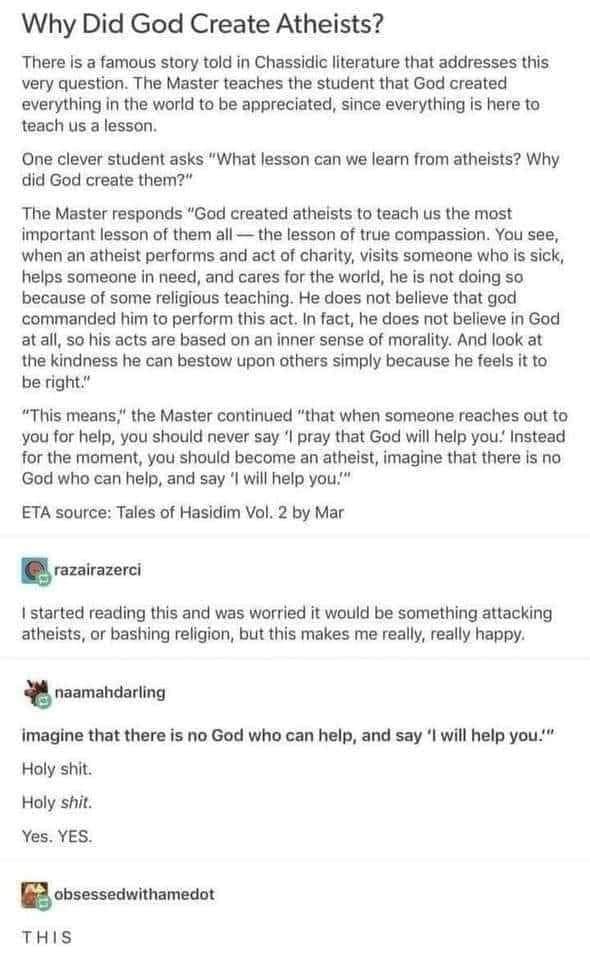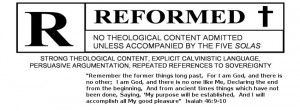Quite a title, right? The image at the bottom of the post was put on facebook by a person I know, about atheists doing good works.
There's a lot packed in there...the image hints that
- God created atheists as an object lesson
- The good works of atheists are somehow more moral than the good works of believers
- "True compassion" can only come from atheists, and good works in Christ are not "true compassion"
- The Bible does have things to say about the good works of believers
- The lesson of "true compassion" is the most important lesson of all.
- When somebody turns to us for help, we should pretend there is no God
- Believers don't help, they only pray.
Did God "create" atheists?
Human beings rebelled against God all by themselves.
Not only that, there are no true atheists, only those who lie to themselves and tell themselves they are atheists
For the wrath of God is revealed from heaven against all ungodliness and unrighteousness of men, who by their unrighteousness suppress the truth.
For what can be known about God is plain to them, because God has shown it to them.
For his invisible attributes, namely, his eternal power and divine nature, have been clearly perceived, ever since the creation of the world, in the things that have been made.
So they are without excuse.
Romans 1:17-20
Are the good works of atheists "moral"?
Here's where the difference between "total depravity" vs "utter depravity" comes in, and why that difference matters.
Utter depravity would mean that man is as bad, as corrupt, as he possibly could be. I don’t think that there’s a human being in this world who is utterly corrupt, but that’s only by the grace of God and by the restraining power of His common grace…….Total depravity, then, does not mean that men are as bad as they conceivably could be.
When the Protestant Reformers talked about total depravity, they meant that sin—its power, its influence, its inclination—affects the whole person. Our bodies are fallen, our hearts are fallen, and our minds are fallen—there’s no part of us that escapes the ravages of our sinful human nature. Sin affects our behavior, our thought life, and even our conversation. The whole person is fallen.
from Ligonier Ministries
The Bible tells us about the good works of the ungodly
For all of us have become like one who is unclean,
And all our righteous deeds are like a filthy garments
Isaiah 64:6
And
For whatever does not proceed from faith is sin
Romans 14:23
What is "true compassion"?
The Greek that is translated "compassion" is σπλαγχνίζομαι (splagchnizomai) and it's a verb. You cannot feel compassion without doing compassion.
or...what good is compassion without works?
The Greeks evidently believed the bowels to be the seat of love and pity (I guess, when you're anxious, where do you feel it?) so the gist of this word is to be moved to action from your bowels with love and pity.
The Hebrew רָחַם (racham) is also a verb and means pretty much the same thing (without the bowel part)
True compassion is an action word, fueled by love and pity.
You don't need to be in rebellion to God to have true compassion.
What does the Bible say about the good works of believers?
The image hints that believers do good works because we're commanded to (no choice) whereas the atheist only does good works because of his higher morality (choice)
Christians do believe that we're commanded to good works. (1 Timothy 6:18 They are to do good, to be rich in good works, to be generous and ready to share)
We believe that these good works are waiting for us (Ephesians 2:10 For we are his workmanship, created in Christ Jesus for good works, which God prepared beforehand, that we should walk in them.)
Question: Is it more or less "moral" to do good works to please God, or to please man?
What does the Bible say about the "most important lesson?
1 Corinthians 15:3 For I delivered to you as of first importance what I also received: that Christ died for our sins in accordance with the Scriptures
The lesson of God's love and redemption is the most important lesson in the Bible.
Jesus answered, “The most important is, ‘Hear, O Israel: The Lord our God, the Lord is one. And you shall love the Lord your God with all your heart and with all your soul and with all your mind and with all your strength.’ The second is this: ‘You shall love your neighbor as yourself.’ There is no other commandment greater than these.”
Mark 12:29-31
(in order)
the lesson of first importance is that Christ died for our sins
The second lesson (teaching) is love God
After that, love your neighbor.
Should we EVER pretend there is no God?
For a Christian, that's just stupid on the face of it.
It ranks right up there is "Caesar is Lord"
All you have to do is deny God (or pretend He doesn't exist" and all will be right with the world.
Nope.
So...what do we do when somebody asks for help?
The image hints that Christians pray that God will help the needy person but they don't do anything.
The image flat-out says that in order to help, you need to be an atheist.
Praying vs helping is a false dichotomy. There is no tension between praying for a person and helping a person.
The Bible tells us:
and one of you says to them, “Go in peace, be warmed and filled,” without giving them the things needed for the body, what good is that?
James 2:16
So the idea that you have to be an atheist to help people is...stupid and anti-biblical.
My conclusion
The image/article had the purpose of making those in rebellion to God feel better about the things that they do.
~~~


 "I'm not going back" is a refrain at our house, and we have reasons...we usually make up a number (reason #848) but I just lost count.
"I'm not going back" is a refrain at our house, and we have reasons...we usually make up a number (reason #848) but I just lost count.